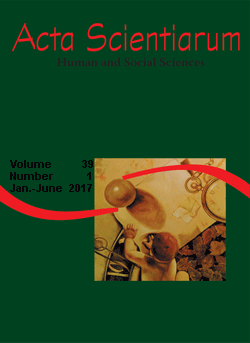<b>Nelson Rodrigues’s <i>Os Sete Gatinhos</i>: Representations and inter-relationships
Abstract
The inter-relationships of social representations of the Noronha family in Nelson Rodrigues’s Os sete gatinhos are analyzed based on the Theory of Social Representations proposed by Serge Moscovici, Denise Jodeletand Sandra Jovchelovitch. The inter-relationships between the characters of the play, especially the power relationships that Mr. Noronha exerts on his wife and five daughters, are investigated. The Noronha family employs social representations as a set of concepts, statements and explanations that originate within daily relationships: the father coordinates the behavior and family’s relations within a world view foregrounded on religious superstition. The family interprets the world through this type of religiosity. The Theory of Social Representations provides the understanding for the formation and functioning of reference systems for the categorization of people and groups and interprets day-to-day events. Rodrigues’s play is a social criticism against the social habits and values of the 1950s.
Downloads
DECLARATION OF ORIGINALITY AND COPYRIGHTS
I Declare that current article is original and has not been submitted for publication, in part or in whole, to any other national or international journal.
The copyrights belong exclusively to the authors. Published content is licensed under Creative Commons Attribution 4.0 (CC BY 4.0) guidelines, which allows sharing (copy and distribution of the material in any medium or format) and adaptation (remix, transform, and build upon the material) for any purpose, even commercially, under the terms of attribution.
Read this link for further information on how to use CC BY 4.0 properly.























